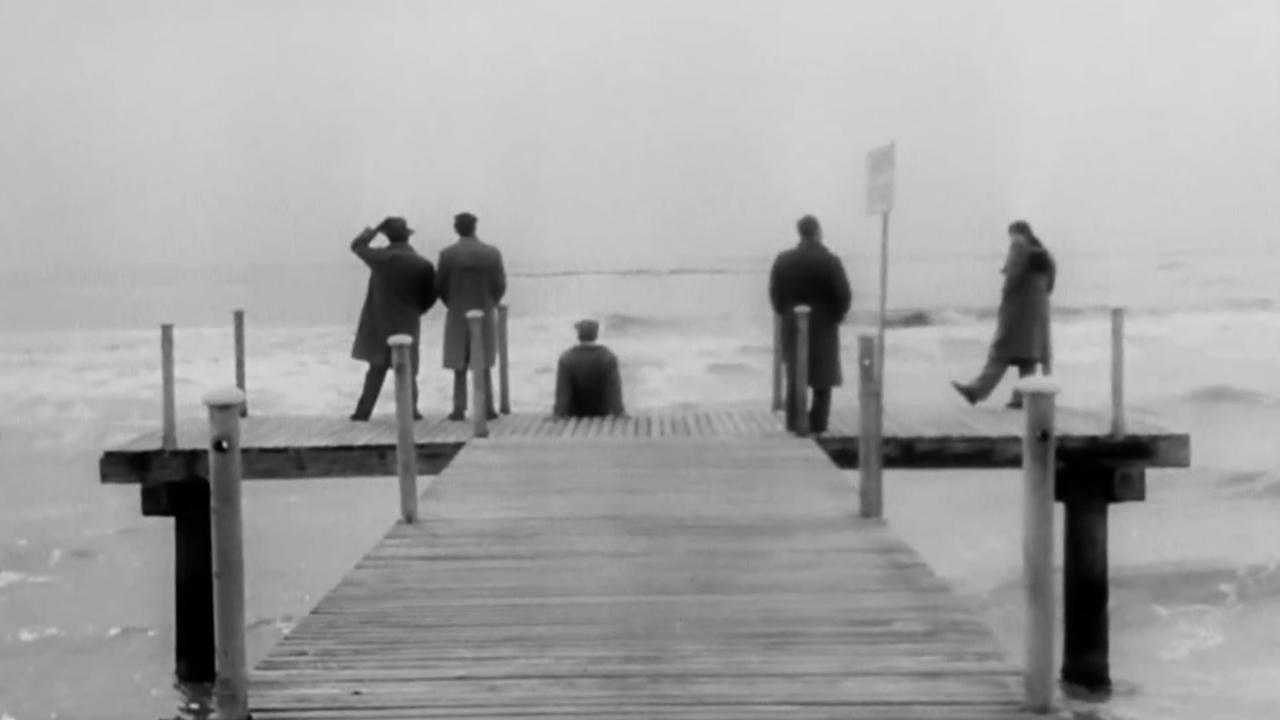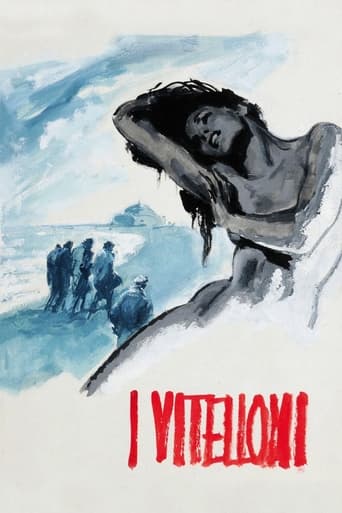

"I Vitelloni" is an early, somehow autobiographical Fellini movie that tells the story of five young men hanging around in a provincial town and trying to make ends meet. In the movie, we get to see what the life of grown-ups who still live in their parents' house (something very common in Italy) is like. The story itself is rather simple and, while it mainly focuses on one character (Fausto), quite tedious although there are some comedian aspects in it (as Fausto betrays his wife and how his employer throws him out). Although Fellini wanted to give some depth to this movie - e.g. by showing the fateful encounter of Moraldo and the boy working at the local railway station - he somehow missed the point. The dialogs are not profound enough, action and reaction of the characters remain predictable and the "spice", which we can find in other Fellini movies, seems to be missing in this one.
... View MoreHere's an example of why this movie - admired by Kubrick and Scorsese and following five young deadbeats roaming around a small Italian city - is great.One of our protagonists, Fausto, is fiercely berated by his stern father. Fausto's girlfriend (sort of) is pregnant and the young man - who fancies himself to be a casanova - must marry her to save her honor (and his own family's). Humiliated, he leaves the house and finds his friends waiting for him in the dark street outside. They've heard everything and stand there looking at him, all awkward and sympathetic... and suddenly burst into a colossal laugh.No matter how realistic, most movies have a certain conventional, staged quality to them; few manage to portray small moments as vivid as the little bit of schadenfreude I mentioned above, or as other scenes showing how sad parties get late at night, how creepy a meeting with a near-stranger can be, how much resentment boils beneath the surface even between friends. Each one of the five heroes eventually faces troubles and humiliations, a darker undertone showing through the cracks of the light facade.Featuring an iconic scene with a young Alberto Sordi gesturing obscenely to a group of road workers before his car sputters and stops next to them, to his terrified dismay.9/10
... View MoreThere seems to be many 'literal' translations for I Viletoni. The Young (Fatted) Calves a popular one, meaning spoilt young men. For me, though, their swooning and parading, showing off and dis-regard for authority and discipline veers me to that other show-off: the buck.What struck me immediately was the sumptuous photography, set design and even then, Fellini's night-time street scenes are full of lighted magic and intrigue. Only in these sorts of Italian films do you want to step out into the night and join these characters - most other directors portray their nocturnal going-ons as seedy, no-go, dangerous places.The four central characters are exsquitedly well groomed, especially Fausto, the womaniser. For unemployed layabouts (Fausto briefly found work in a religious curio shop) he is one sharp dude, who looked to me strikingly like Richard Burton - and indeed, Sandra, his long suffering wife, as Elizabeth Taylor. I couldn't help comparing the domesticity to the British kitchen sink dramas of the '60s, or even the odd early Bergman. I also felt some of Preston Sturge's influences may have been bestowed on Mr Fellini. I totally see where Marty Scorsese gets his influence from, especially in his Mean Streets. You can almost tick off which character would be which, but being the great man he is, naturally updated it, transferred it and made those night-times daring and dangerous. The scene where they all go by train out into the country and argue as to which bird is in song, reminded me of a similar one in Trainspotting. Of course, the despairing arguments in that one are of a rather more spurious and coarse nature! The Carnival scene is superbly exuberant, full of 'colour' and pizazz. You can almost hear the buzz and crackle and laughter. When Fausto helps his drunk friend home, much to the annoyance of Sandra recalled another Italian tradition - the love of your 'brother' (or friend) over that of any woman, whether she be wife or not. That spills over and continues with Scorsese to this day. The ending too, has the emerging hallmarks of Fellini - thought provoking, complentative, still. But, for me, this isn't Fellini's greatest. More concise and focused than the (often) rambling La Dolce Vita, but where I prefer Scorsese's Taxi Driver over Mean Streets, I yearn for more of a story and unfolding narrative than pure character study, however well done. I enjoy Fellini's allegorical ding-bats and his opening up of the hypocrisies of religious tradition. You don't get those in I Vitelloni.Sharply observed and styled, definitely; ultimately satisfying? Not totally.
... View MoreAs a Fellini film, I Vitelloni makes far less use of the curious fast-sketch scenes, surprising close-ups, proficient handling of associations between foreground and background that shaped so much of Fellini's baroque lexicon, and there are fewer of the brutes and fantastical characters that habitate his most noticed output. In places the camera-work is unusually fixed. But notwithstanding its comparatively common approach, "The Guys" takes the first absolute dive into many of Fellini's major subjective obsessions: delayed maturity in men, marriage and infidelity, the life of insular communities counter to the city, the despondent occult of bare nighttime streets, the seashore, the movies themselves. The movie hangs us on the horns of an impenetrable quandary that is the gist of Fellini's movies. That quandary takes slightly varying routes, however eventually suggests as if to branch from the strain between childhood's feeling of awe and promise, with its whirlpool of youthful reliance and collapse if the individual can't mature, and likewise the matter-of-fact and pragmatic grasp of life's obligations and setbacks, which carries its own whirlpool of likely ridicule, bitterness and degradation.This pressure identifies its most direct interpretation in the echoing images of the misuse of the incomprehensible, provocative or pure by those whose self-image or appetite for power has confused them about what is most valuable. The vitelloni are a kind of bucolic Rat Pack, living off mothers, sisters and fathers, dressing snazzily, chasing women and trifling their days away in a small seaside town supposedly patterned on Fellini's home town. Alberto Sordi and Leopoldo Trieste are excellent here, together with Franco Fabrizi, who bears a bizarre likeness to young Elvis Presley. Franco Interlenghi plays the pensive one and the only one on a quest for understanding the life they lead. Riccardo Fellini, dead ringer for his older director brother, is considerably more elusive as a character. Against their vainglory and apathy is postured the durability and wariness of the town's older men, who have seized the conventional duties of middle-class family life. Yet respectable as that may be, these solid citizens—predictable, content with their lot, stuck in choked interior settings—are barely made to appear an encouraging recourse.The closest I Vitelloni comes to any genuine representation of assurance or affirmation is the character of the station boy with whom Interlenghi passes time intermittently during his night-time roaming. I Vitelloni is replete with refined and handsomely delivered dramatic and comic moments: Sordi standing next to Fabrizi and blocking Sandra as they pose for the wedding photo; Trieste in a vainglorious rapture reading his banality-riddled play to the weathering actor Natali as the latter makes a glutton of himself and the vitelloni flirt with the female members of the actor's ensemble. Overall, Nino Rota's score strikes its own distinguishing poise between crassness and agonized reminiscence. Disinclined to endings that wrap things up too tidily, or that iron out the drama in a clear-cut fashion, despite being essentially a practical structuralist, Fellini gives us an image unfamiliar to a lot of favored filmmakers: the ending of a story shown not as a destination, instead as an adapted farewell.
... View More